70% of sales professionals report burnout that keeps them from reaching peak performance.
For a small business, that number is crushing: it means missed opportunities and stressed-out teams.
A sales CRM software for small businesses can change the story. Instead of drowning in manual tasks and unorganized customer data, teams get a single place to track every sales activity.
This article looks at modern CRM solutions that support better customer relationships and give sales teams the bandwidth to focus on growth instead of exhaustion.
Why sales CRM is more than "another tool" for sales
Salespeople often ignore CRM because it feels like extra admin. They keep notes in email threads or park leads in a spreadsheet, and for a while, it works. But then growth kicks in.
Data gets messy, and the company is left with technical debt: half-set-up systems, missing records, lost deals, and frustrated teams trying to patch it all together.
A sales CRM software for small businesses changes that equation.
When it’s easy to use, it quietly removes friction from everyday work: keeping customer data in one place, flagging overdue follow-ups before they’re forgotten, analyzing deals, and surfacing patterns in deals that would otherwise be lost in the shuffle.
Instead of piling on more tools, it simplifies the stack and gives salespeople the context they need to have better conversations and win more deals.
That’s why it’s not “just another tool.” The right CRM becomes the operating system for how a team sells; when ignored, the absence of it becomes painfully obvious.
What is the best CRM system for sales teams?
Capsule CRM: clean, capable, and focused on sales
Capsule shines in sales settings because it strips away clutter and lets your team track deals clearly, while still supporting client management and delivery workflows. It’s ideal for small sales teams who want a balance between usability and capability.
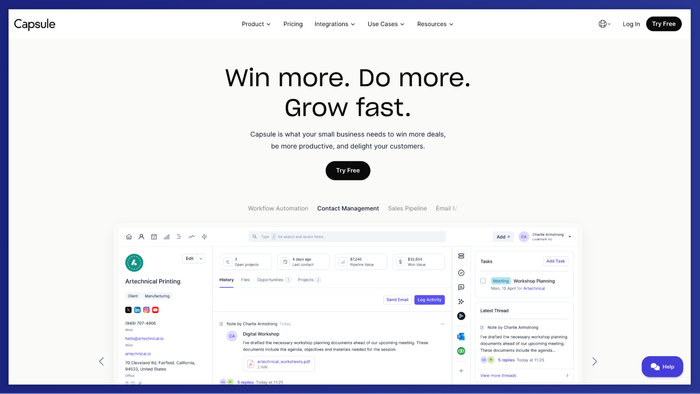
Key features
- Contact management. Capsule maintains full client and company profiles with past interactions, tags, and related links so your sales reps always know the back story.
- Customizable pipelines (multiple). You can build pipelines suited to different processes (e.g., prospecting, onboarding, renewals) and switch between them, giving visibility on all deal flows.
- Task, calendar & reminders. Tasks and reminders sync with your calendar (Google/Outlook), helping your team stay on top of follow-ups.
- Workflow automation. With Tracks, you can automate recurring sequences to reduce manual overhead and enforce consistency.
- Project boards & delivery tie-ins. In paid plans, Capsule lets you manage project work (tasks, milestones) linked to deals or clients, bridging the gap between sales and delivery.
- Email tools & shared inbox. You can send emails inside Capsule, use templates, share a mailbox across your team (e.g., sales@ or info@), and log communication history automatically.
- Custom fields, tags & branding. You have the flexibility to adapt the CRM to your business: create your own fields, use tags to segment, and apply your logo or color scheme.
- Integrations & data enrichment. Capsule connects with Gmail, Outlook, Xero, QuickBooks, Zapier, and auto-enriches contact records with company info, social profiles, and more.
Why salespeople really like Capsule
- Shared mailboxes let multiple reps respond from one inbox, while keeping things transparent internally
- AI content assist (on higher tiers) that suggests email text, speeding outreach
- Auto-logging of emails means fewer manual entries: just write and send
- Mobile apps let you retrieve contacts, log calls or notes when you're out in the field
Pricing/plan highlights
- Free plan: forever free for up to 2 users, with 250 contacts, 5 custom fields, 1 pipeline, email logging, app access, and more.
- Starter: ~$18/user/month; adds more contacts, email templates, shared mailbox, basic reporting.
- Growth: ~$36/user/month; unlocks workflow automation, multiple pipelines & project boards, expanded reporting, and team permissions.
- Advanced / Ultimate tiers: $54+/user/month and up; scale contacts, enhance enrichment, add advanced limits, priority support.
Capsule is a top-rated CRM for sales teams. Give it a try today.
Pipedrive
Pipedrive is a popular CRM that was created by sales teams who wanted less admin and more selling.
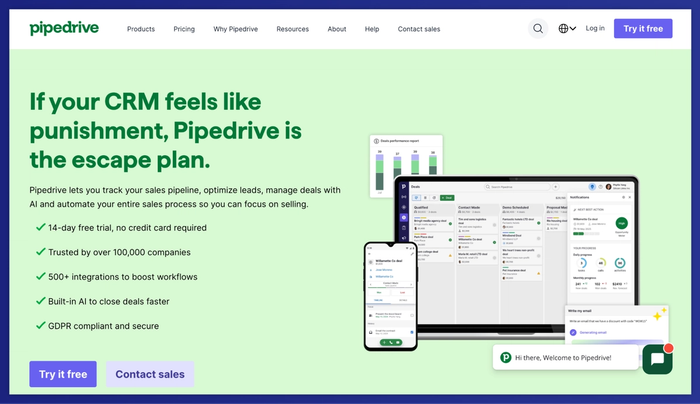
Its visual approach to the sales pipeline makes it one of the favorite tools for small businesses aiming for real growth without wasting hours on a steep learning curve.
Key features
- Visual pipeline management → Drag-and-drop stages make it easy to track leads and spot bottlenecks at a glance.
- Built-in communication tools → Two-way email sync with Gmail/Outlook plus scheduling links reduce context-switching and consolidate your tech stack.
- Workflow automation → Automates repetitive follow-ups, assignments, and deal movements.
Considerations
- Reporting tools give you the basics, but they lack the advanced customization some teams want.
- It’s a CRM platform tailored for sales only; marketing campaigns and support still need add-ons.
- Certain upgrades, like Smart Docs or lead tracking, aren’t included in entry-level plans.
- A credit card is required after the free trial, which may be a barrier for some teams testing different CRMs.
Pricing
Paid Pipedrive plans start at $25 per user/month. Higher tiers expand into multiple pipelines, advanced forecasting, and automation options.
Pipedrive is one of the best CRM tools for focused sales execution, but compared with Capsule, it’s less about versatility in managing customer relationships and more about pure deal flow.
Salesflare
Salesflare positions itself as an AI-powered CRM designed to take the grunt work out of sales.
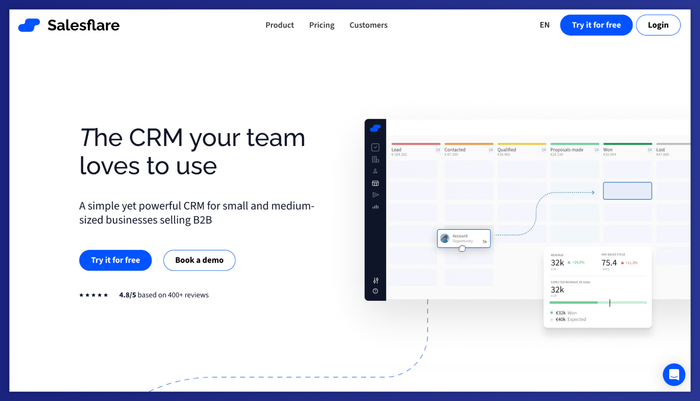
For small businesses that want to move through the sales cycle faster, it automatically collects CRM data from emails and social accounts – so reps spend more time talking to current and potential customers.
Key features
- Automated data collection → Pulls details from email signatures, calendars, and social media to keep contact records complete, ensuring your team has context at every stage of the entire sales cycle.
- AI-powered lead scoring → Highlights the hottest leads so you know where to focus attention, which can directly boost customer retention and prevent churn.
- Smart follow-ups and sequences → Let you automate routine tasks like reminders and email sequences.
Considerations
- Lacks a built-in dialer, so calling requires integrations or external tools.
- Meeting scheduling isn’t native, which some users find limiting.
- Customization is intentionally minimal; great for simplicity, but not for businesses needing highly tailored workflows.
- Pricing can feel steep if you’re only using a fraction of its automation capabilities.
Pricing
Plans start around $29 per user/month for the Growth tier. Higher tiers expand AI-powered CRM functions and deeper automation features.
Salesflare is excellent for teams that value sales automation and want to drive business growth without drowning in admin, but Capsule remains the easier option if your priority is simplicity over intelligence.
HubSpot CRM
HubSpot CRM is one of the most widely adopted platforms among small businesses, largely because it combines lead management and customer support in a single ecosystem.
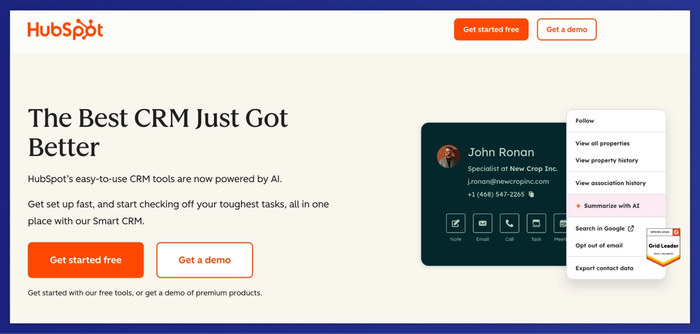
It helps teams reduce administrative tasks and handle the full sales journey.
Key features
- Contact and lead tracking → Store and organize all client interactions in one place, making it easier to nurture relationships and keep track of every opportunity.
- Sales pipeline tracking → Offers visual pipelines with drag-and-drop deal stages.
- Marketing and customer support integration → Emails, chat, helpdesk tickets, and campaign tracking all live in the same CRM, simplifying the handoff between sales and service.
Considerations
- The free tier is generous, but scaling introduces higher CRM costs, especially for advanced automation or reporting.
- Mandatory onboarding fees in Pro/Enterprise plans can be a hurdle.
- With so many modules, some users feel overwhelmed when first setting up the system.
- Heavy reliance on add-ons can lead to tool sprawl if you don’t stay within HubSpot’s ecosystem.
Pricing
Free HubSpot plan available with core CRM features. Paid plans scale up based on contacts and functionality, with Starter starting around $20–$30 per user/month. Costs can climb significantly in higher tiers.
HubSpot CRM is powerful for teams that want to improve productivity and manage everything under one roof, but compared to Capsule, it comes with a heavier setup and steeper costs.
Freshsales
Freshsales positions itself as a customer relationship management software built for small teams that want to simplify their sales process without losing functionality.
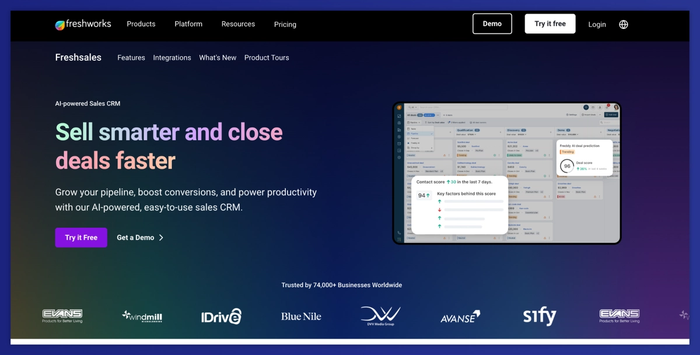
It combines calling, emailing, and contact management in one place.
Key features
- Built-in phone and email tools → Reps can call, email, and log conversations directly inside the CRM.
- Sales tracking → Clear deal stages give sales teams visibility into where prospects are stuck, and managers a better sense of future sales data.
- Automation and sequences → Supports business development by automating follow-ups, nurturing prospects, and moving deals along without extra admin.
Considerations
- Some users note that feature sets shift between plans, meaning you may need to upgrade for tools you previously used.
- Advanced reporting is limited unless you’re on higher tiers.
- Customization is decent but not as deep as larger customer relationship management systems.
- Occasional performance hiccups with large contact lists.
Pricing
Free tier for small teams, with paid plans starting around $15–$18 per user/month. Higher tiers add broader integrations and built-in tools.
Freshsales works well for teams focused on business growth, but Capsule often feels lighter and easier to pick up quickly.
Checklist before choosing a sales CRM
- Does it actually improve sales efficiency?A CRM should help your reps close deals faster, not add more repetitive work.
- Can it map the full customer journey?Look for tools that track customer activity and shape a better customer experience from first touch to renewal.
- Is it a unified platform or another silo?The best systems give you one platform with full access for the whole team, not scattered logins across other apps.
- What’s the real entry barrier?Some vendors advertise “free trials,” but check if a credit card is required or a credit card is needed just to test basic features.
- Does it actually increase productivity?Features like automated meeting links and task automation should free up hours so your reps can stay a step ahead.
- Is it built for your size?A CRM for small businesses should be simple and flexible, not bloated with features made for large enterprises.
- Will it support informed decisions?Dashboards, reporting, and integrations should give leaders the clarity to act quickly and keep the team aligned.
Customer data is useless without customer relationships
Collecting endless records means little if they don’t translate into real connections. The best CRMs for small businesses are all about helping teams nurture trust and move deals forward. In the end, strong customer relationships are what turn raw customer data into growth.
Capsule gives small teams a clear picture of every client story, not just a list of contacts.
Try Capsule and see how simple CRM can reshape your customer relationships.




